Federal Market Intelligence
Price Reporter Dashboard is a robust market intelligence research tool that offers data and analysis of US Government business on GSA Advantage and FedMall. It helps clients assess their GSA contract performance and identify opportunities to enhance their GSA business.


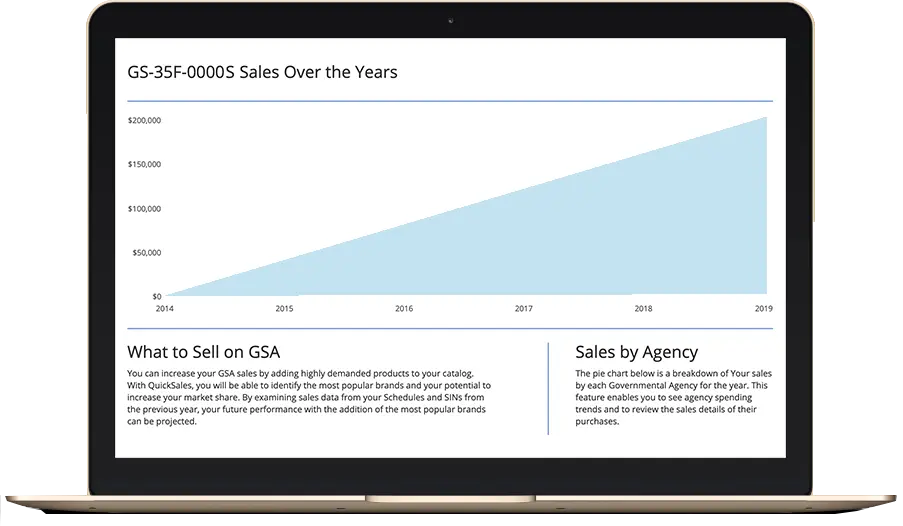
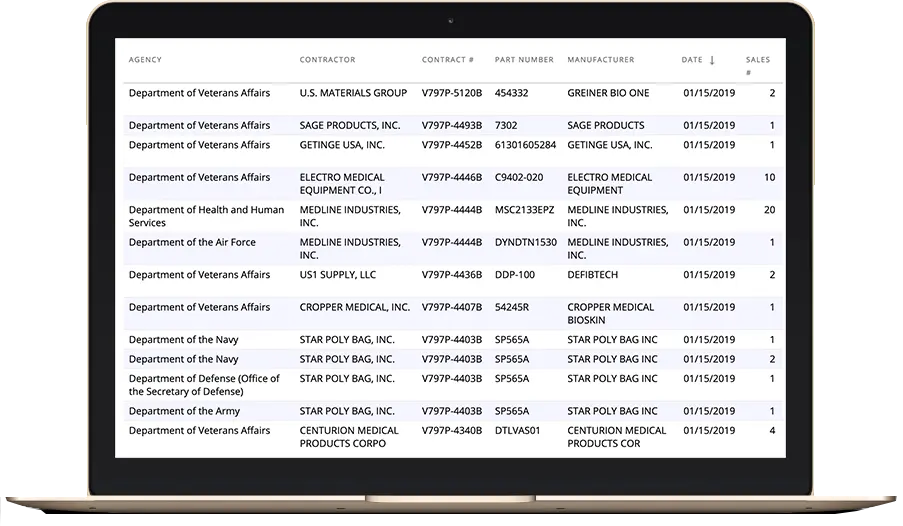
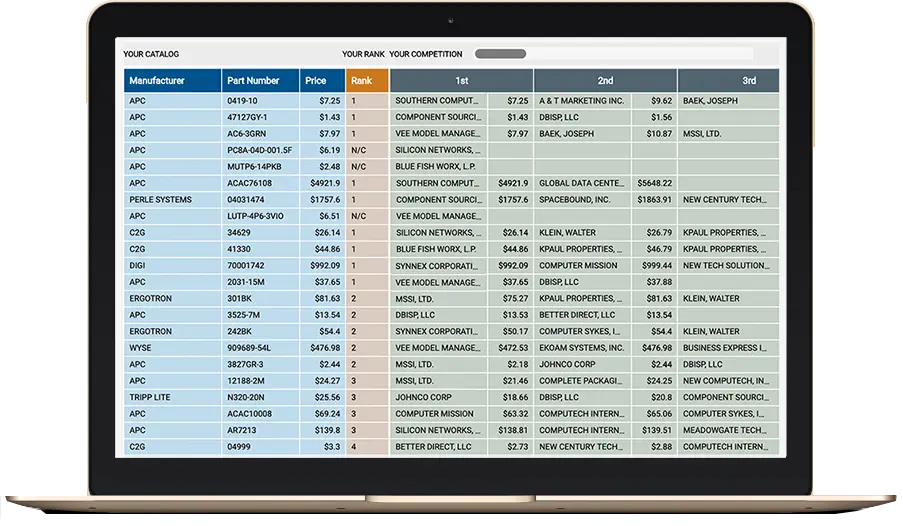
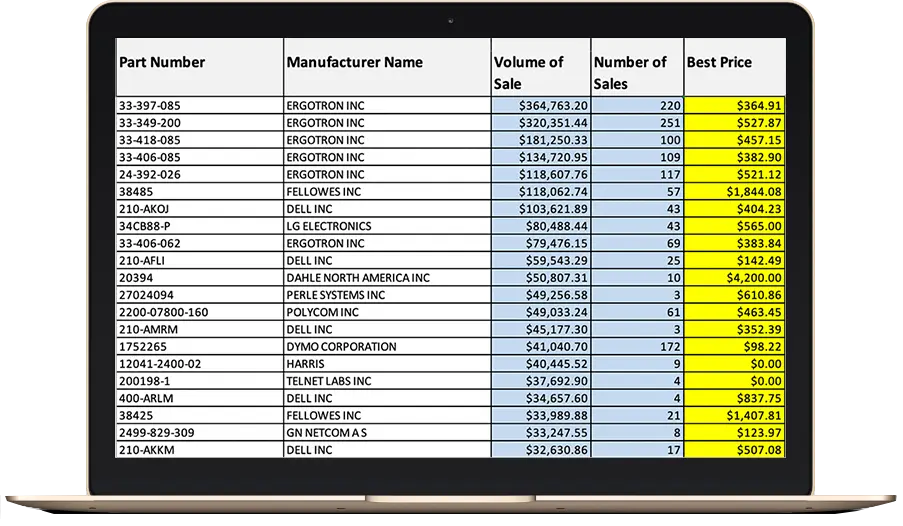
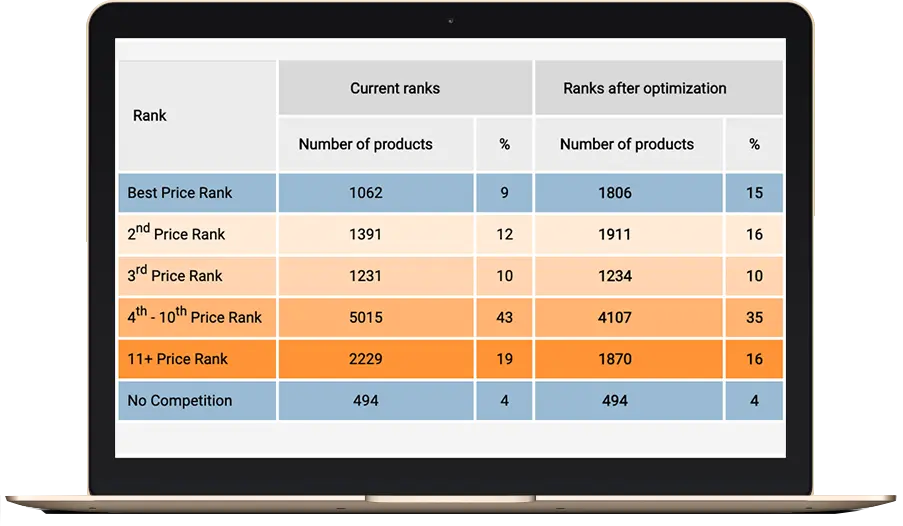
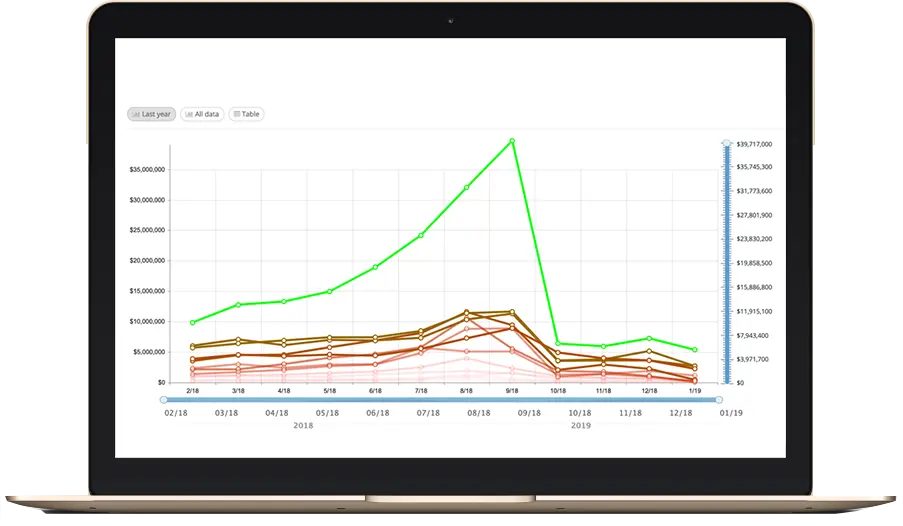
Small and minority-owned businesses can gain a competitive advantage in the complex federal procurement system with Price Reporters Federal Market Intelligence (FMI), offering:
- Data analysis on Federal contract spending and opportunities.
- Valuable insights into the competitive landscape.
- Strategic decision-making support.
- Emphasis on inclusion and socio-economic equity in procurement processes.
Learn how to analyze your GSA contract performance and discover opportunities to maximize your GSA business
Contact us at 201.567.6646 or provide your details below for one hour free consultation
To address the historical dominance of large corporations in federal procurement contracts over small and minority-owned businesses, federal agencies are taking proactive steps:
- Actively seeking diverse suppliers through strategies like contract set-asides and procurement procedure training.
- Providing support through federal business certifications such as WOSB and SDVOSB designations.
- Offering mentorship programs, emphasizing measurable results through performance-based contracting, and utilizing market intelligence tools to help these businesses compete effectively.
Effective Strategies for Navigating Federal Procurement Regulation
In today’s complex federal contracting landscape, contractors must navigate shifting procurement regulations effectively. Here are key techniques they use:
- Conduct Qualitative Federal Government Market Research:
- Understand the federal procurement landscape.
- Identify opportunities and set competitive prices.
- Update catalogs and craft successful proposals.
- Utilize Federal Procurement Databases:
- Access resources like GSA’s System for Award Management (SAM).
- Identify federal procurement opportunities and track trends.
- Stay Informed on Federal Procurement Reform:
- Keep up with changing regulations.
- Monitor GSA’s updates and participate in industry associations and webinars.
- Seek Guidance from Experienced Advisors:
- Collaborate with experts like Price Reporter for:
- Deep understanding of federal procurement regulations.
- Compliance guidance.
- Best practices for GSA problem resolution and addressing pain points.
Effective Risk Management in Federal Procurement: Key Strategies
Efficient risk management is vital in the federal procurement. Federal agencies and GSA schedule holders play crucial roles in this process. As a contractor, here are essential practices to consider:
- Understand GSA regulations: Familiarize yourself with pertinent regulations, including the Federal Acquisition Regulation (FAR) and the Defence Federal Acquisition Regulation Supplement (DFARS).
- Implement risk management: Develop and execute a robust risk management plan that identifies potential risks and outlines effective mitigation strategies.
- Provide regular updates: Keep federal agencies informed about risk management activities and promptly report any emerging risks during the procurement process.
- Train employees: Ensure all employees involved in procurement are well-versed in risk management best practices and adhere to federal regulations.
- Maintain records: Keep comprehensive records of all risk management activities, ready for documentation requests, such as audits by the GSA.
- By adhering to these key strategies, federal agencies and GSA schedule holders can effectively manage risk throughout the procurement process, enhancing overall procurement outcomes and safety for agency personnel.
Price Reporter team has been efficient at managing our GSA contract catalogs for the past 5 years. They keep our catalogs well maintained and compliant, saving our resources and letting us focusing on making sales.
The B. David Company enlisted the services of Price Reporter, Inc. to setup our DOD EMALL account. We are a second generation family owned company and were uncertain what would be required to complete this task. I fully recommend Price Reporter, Inc. to any company that is looking for assistance with their Government business endeavors. They were and have continued to be extremely helpful. We will continue to rely on Price Reporter, Inc. for future projects.

Price Reporter recently helped us with our 3rd GSA contract, the 2nd they did with us. It was the fastest we’ve ever been through the process with GSA. Each step was easy because the ground work was done before we were asked to do anything. Our pricing verification phase went smooth and quickly and both our contracts were accepted without rejection, with minimal negotiations with contracting.

We first learned about the DOD EMALL a couple years ago from Price Reporter. We decided to move forward on it in 2016. I would recommend them based on the following items:
- They split the payment. Half upfront and the other half is only charged should DOD EMALL contract be awarded to you.
- Adding Price Reporter, specifically Andrey Karpov and Igor London, as agents on our GSA schedule streamlined the process. They were able to communicate with our GSA Contracting Officer to ensure that we received what we needed for DOD EMALL from GSA. This saved time on my end and sped up the process.
- They provide a list of everything you need. Andrey and the rest of his team are meticulous and understand the process on how to get a DOD EMALL contract and thus we benefited from their expertise.
These are a few of the reasons why I would recommend Price Reporter, Inc. Thank you!
Since 2009, Price Reporter has provided Fisher Scientific timely competitive item level GSA pricing data allowing us to identify opportunities and threats. Their customer service focus is solid.
Price Reporter are helping make my life much easier and helping me feel so much better about our GSA contract. Thanks!!!

For the past 10 years, Price Reporter has been providing us with exceptional service for the maintaining of our GSA office supplies contract. They have updated our files on a very timely basis. They have provided modifications when required. For a number of years, they had been giving us a price algorithm where each of our items were priced more than our cost and a penny below the next competitor. A very unique position that gave us thousands of government orders – that was prior to the GSA FSSI BPA.
And for all the service given, their cost was far less than any other consulting firm that we had contacted or worked with over the years.
I would highly recommend their service to any small business that is either interested in getting into the federal government arena or who wants to have their contract maintained at a most highly professional level.
Thank you for supporting a VETERAN OWNED SMALL BUSINESS.
We looked around for a reputable company to help us acquire a GSA contract for Muzeek World Intl., Inc. After looking around we were unsuccessful in finding a good company. By chance, one of our colleagues recommended Price Reporter, Inc., so we called them up. I highly recommend Price Reporter to anyone looking for help in acquiring a GSA contract or any Government business dealings. They have the expertise and the know-how to get the work completed.
We have used Price Reporter for various services over the past 5 years and have been very happy with the services they have provided and continue to provide for us. They work hard to help you get the most from your GSA Schedule and are able to adapt and customize to what your particular needs are. I highly recommend their services to others with GSA Schedules as they help you maximize your sales

We are extremely grateful for all your help in guiding us through the whole process, as this was all new to us. Without the help of you and the rest of the team at Price Reporter, it would have been impossible to achieve our approval – or at the very least – it would have taken a very long time. I would not hesitate to highly recommend Price Reporter, Inc. to anyone needing assistance in government contracts. Your knowledge and assistance was invaluable and very much appreciated, and we look forward to a continued excellent relationship.
Without Price Reporter contacting me at the right time, GSA would probably cancel my contract already. The CO said that she contacted us back in November of 2016, but got no response. Then Price Reporter called me and helped me with all the things needed and I followed his advise. That’s how we found out that our contract will be terminated soon, but had enough time to take the corrective action. The CO called us recently and it looks like they will extend our contract life. Thanks so much for your timely follow up – Price Reporter gave our Government sales a new hope!

My company STEC-STEADFAST TECHNICS have worked with 2 IT companies before we linked up with PRICE REPORTER ,INC over 5 years ago. Ever since our relationship with the company, there is no reason to stop working with them.
The company is staffed with experienced and high Tech professionals who meet our needs adequately.


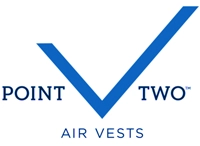
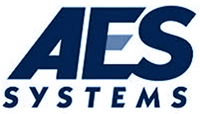
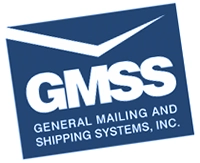

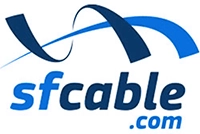


















Schedule holders navigating the federal procurement system can be a formidable task, but small and minority-owned businesses can now get an edge with Price Reporters Federal Market Intelligence (FMI).
We analyze data on Federal contract spending and contract opportunities, Price Reporter FMI provides invaluable awareness of this competitive landscape. Armed with this knowledge, your business can make strategic decisions to stay ahead of the curve.
Pressure on government agencies is intense as they try to balance budgetary constraints and meet their mandated responsibility towards small and minority-owned business enterprises (SMOBEs). The need to diversify supply chains extends beyond financial accountability alone — promoting socio-economic equity is essential; hence prioritizing inclusion over reduced pricing is a highlighted essential element through all stages of procurement processes.
HOW CAN FEDERAL AGENCIES BALANCE THE NEED FOR COST-EFFICIENT PROCUREMENT WITH THE DESIRE TO SUPPORT SMALL AND MINORITY-OWNED BUSINESSES?
For many years, large corporations have dominated federal procurement contracts at the expense of small and minority-owned businesses.
To level the playing field, agencies
- Actively seek diverse suppliers by using strategies like setting aside contracts or providing training on navigating the challenging procurement procedure.
- With support from federal business certifications like WOSB (Woman Owned Small Business) or SDVOSB (Service-Disabled Veteran-Owned Small Business) designations, small businesses can win more contracts and contribute even more to our economy.
- Small and minority-owned businesses face major challenges when it comes to competing in the federal procurement market. However, there are ways in which federal agencies provide assistance to redress this imbalance. By offering mentorship programs that furnish advice on proposal creation and process navigation as well as relationship-building tactics with governmental bodies; while emphasizing a focus on measurable results over traditional inputs through performance-based contracting initiatives – these objectives become more achievable.
- Small and minority-owned enterprises struggle to compete in the federal procurement marketplace because of resources, but by using market intelligence tools like Price Reporters FMI can help level the playing field.
WHAT STRATEGIES CAN FEDERAL CONTRACTORS USE TO SUCCESSFULLY NAVIGATE THE COMPLEX AND EVER-CHANGING LANDSCAPE OF FEDERAL PROCUREMENT REGULATIONS?
Today, federal contractors face a complex and shifting landscape of procurement regulations.
To effectively traverse this landscape, contractors need to have a strategy and be knowledgeable. Here are some techniques contractors use:
- Conduct qualitative federal government market research: To optimize the utilization of your GSA schedule/GSA Contract you should complete regular marker research to understand the federal procurement landscape to identify opportunities and set order-winning prices, update catalogs, and write successful proposals.
- Use federal procurement databases: Federal contractors can use federal procurement databases, such as the General Services Administration’s (GSA) System for Award Management (SAM), to identify federal procurement opportunities and track procurement trends.
- Stay up-to-date on federal procurement reform: Federal procurement regulations are always changing, and contractors have to stay up-to-date on the latest changes. A schedule holder can do this by monitoring GSA’s regulatory updates and participating in industry associations and webinars where you can ask Federal Government representatives questions directly.
- Building a winning federal proposal: Federal contractors must write a proposal that meets the customer’s needs and requirements. For this to occur potential schedule holders should conduct qualitative market research, to understand the customer’s pain points, and to highlight the contractor’s unique value.
- Work with experienced advisors: Federal contractors should work with experienced advisors like Price Reporter:
- We have a deep understanding of federal procurement regulations
- We can provide guidance on compliance
- We can guide you on “Best Practices” for GSA problem resolution and pain points
HOW CAN FEDERAL AGENCIES ENSURE THAT THEY ARE EFFECTIVELY MANAGING RISK THROUGHOUT THE PROCUREMENT PROCESS?
Comprehensive risk management analysis marks an essential feature of the procurement process for federal institutions owing to its relevance in identifying any likely hazards associated with purchasing products or services while ensuring employee protection within those agencies.
Recognizing this fact, GSA schedule holders should carry out their predetermined responsibilities toward proper risk management implementation. Here are several key points to bear in mind:
For Federal Agencies:
- Performing thorough risk assessment: Ahead of making any procurement decisions, The GSA perform a comprehensive risk assessment to identify potential risks and develop strategies to mitigate them. For example, the process and minimum requirements in getting a GSA Schedule ensure (to a degree) that only reputable businesses are given the opportunity to sell to the Federal Government.
- Communicate with GSA schedule holders: Federal agencies must communicate their risk management expectations to GSA schedule holders to ensure that they are aware of their responsibilities and comply with federal regulations. This is done by requiring schedule holders to undergo mandatory training and setting up seminars/webinars to communicate with Federal vendors.
- Choosing reputable vendors: Federal agencies should only work with vendors who have a proven track record of delivering quality products and services and have a strong reputation for risk management.
- Monitor performance: Federal agencies must monitor the performance of GSA schedule holders and intervene if necessary to ensure that they comply with risk management requirements, “No Order Left Behind” is an initiative to ensure Federal employees are getting value for money and to ensure schedule holders stick to their contractual pledges.
GSA Schedule Holders:
- Understanding GSA regulations: GSA schedule holders must familiarize themselves with all the regulations related to risk management, this includes the Federal Acquisition Regulation (FAR) and the Defense Federal Acquisition Regulation Supplement (DFARS).
- Implement risk management: GSA schedule holders must develop/implement a risk management plan that identifies potential risks and outlines strategies for mitigating them.
- Provide regular updates: GSA schedule holders must provide regular updates to federal agencies on their risk management activities and any potential risks that may arise during the procurement process.
- Train employees: GSA schedule holders must ensure that all employees involved in the procurement process are trained on risk management best practices and comply with federal regulations.
- Maintaining records: GSA schedule holders must maintain records of all risk management activities and be prepared to provide documentation upon request, for example: when the GSA performs an audit on the contract holders company.
Price Reporter covers all aspects of GSA Contract Management, whether you want an instant snapshot of your current price rankings in GSA Advantage or you want ongoing access to the Federal Market Intelligence (updated regularly), call us today to get your contract working for you.





